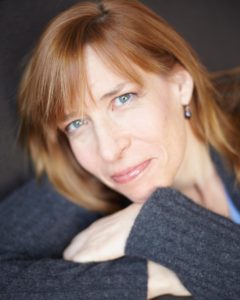Following her Barrymore Award for Best Actress as Martha in Theatre Exile’s 2014 production of Who’s Afraid of Virginia Woolf?, which was preceded by two Barrymore Nominations for Best Actress with the company – as Faye in Iron (2010) and Emma in Annapurna (2014) – Catharine Slusar returns to the stage at Studio X in the Philadelphia premiere of John Pollono’s Lost Girls.

A native of Connecticut, alumna of Yale University, member of Actors’ Equity Association, resident of Philadelphia since 1995, and recipient of the Barrymores’ F. Otto Haas Award for an Emerging Philadelphia Theatre Artist in 2001, Slusar has performed with a wide array of local theaters, as well as nationally and internationally. In addition to her impressive acting credentials, she shares her expertise with students as an Assistant Professor at Bryn Mawr College and in an ongoing partnership with the E.M. Stanton School in South Philadelphia, where her focus is on Shakespeare.
Despite her busy schedule, Catharine was kind enough to come in early to Studio X, to chat with me before an afternoon rehearsal and the first preview of Lost Girls. The play, performed for the first time at Exile on a revolving stage, is set in New Hampshire during a snowy winter. It tells the story of three generations of women in a working-class family, caught in a cycle of teen pregnancy. Directed by Exile’s Founding Artistic Director Joe Canuso, it has all the “grit and passion” of the company’s signature style, as it explores the human condition with dark humor, foul language, and keen insight.

Deb: Lost Girls is the fourth production you’ve done with Theatre Exile. Aside from the Barrymore recognition, what is it about Exile’s style that keeps you coming back?
Catharine: It’s a people-focused theater. The design and direction are structured to work with the actors, to respect them, and to promote what we have to bring to the table. We can take chances. I’ve done wildly different roles here, I’m not put into a box. The designers, directors, and actors all take chances, and I’ve been fortunate to work with both Joe and Deb [Deborah Block, Director of Iron, and Exile’s Producing Artistic Director], and I would love to work with Pfeif [Matt Pfeiffer, Associate Artistic Director at Exile]. So by saying it’s people-focused, I mean it feels like an actors’ theater. It’s human-scaled, and they do top-quality productions in a tiny space, by putting their money into the people. There is something thrilling about doing theater in a space so small that the molecules in the air seem to shift depending on who is present. All live theater is dependent on the audience, but at Exile their presence is palpable. It is a luxury.
What does Joe Canuso bring to the plays he directs, and why do you enjoy working with him?
Joe has deep passion, a lot of heart, and a spirit of camaraderie. He trusts me, we speak the same language. This play is unusual for me, and it shows his trust in me, that he was willing to try something different. He does not cast me as a ‘type,’ but as a person able to play a wide range of characters.
How did your casting in Lost Girls come about? Were you involved from the beginning of Exile’s interest in producing it this season?
Yes, I was involved from the beginning. Joe came to me conditionally, with the understanding that my casting would depend on who was cast in the lead role of Maggie, because it’s about a family. I’m not the main character, I play Maggie’s mother Linda, a believable member of the family with Molly Ward cast in the lead role.

Although the play is about three generations of women, it was written by a man, and is being directed by a man. Do you think men are able to create believable female characters, or do they have a completely different perspective and experience than a woman would?
First of all, they don’t create the characters – they create them in concert with the actors. I’m very aware of gender in theater, and I see that there are fewer and fewer roles for women of a certain age, between one’s mother years and one’s grandmother years. I believe there need to be more roles for women in the theater, both onstage and off. In this, I’m playing the grandmother of Maggie’s teenage daughter, because the women in the story had children at an extraordinarily young age, in their teens. The fact that John made the play female-centric speaks of his upbringing and his desire to focus on women, which shouldn’t be minimized. There are many important areas of expertise that John brings. He knows New Hampshire, where Lost Girls is set; he grew up there, and it feels authentic. He knows the people who inhabit his plays because they are HIS people, his family. And Joe grew up in South Philly, and he understands working-class people, and actors. Yes, it’s written by a man, but he wrote four women and two men into the play. John and Joe rely on the actors to bring the women’s understanding. I should also mention that other productions of the play were done prior to the last presidential election, pre-Trump, so I’m curious to see where this will land.

Tell us about your character. Is there anything in her that you can relate to, or that you see in yourself?
Yes, of course! Number one is her fierce love for her daughter. She didn’t have a good role model in her own mother, she doesn’t really know how to be a mother, yet she’s fierce – and I’m a fierce mom myself. My twin daughters are fifteen, and I would do anything for them, so that’s my main connector with the character. Linda has already, to use the colorful language of the play, given all the fucks, so she has none left to give. Her attitude is “This is me, so live with it.” She really doesn’t take crap from anyone, and I love that. The harder aspects of her for me are her politics – and I’m very political. Though it doesn’t specifically say it in the script, she seems like someone who would have voted for Trump. She has a few lines about girls getting pregnant, that it’s not the boys’ fault, it’s their fault, it’s up to them to take care of themselves. It’s visceral for her, it’s survival; she knows men aren’t going to do it for them. Her world is really stark, and that’s how she survives. In my private life, I haven’t understood how a woman could speak, or vote, against her own interests. Yet I see here, at least for Linda, it’s from a place of survival. It is fascinating to play someone with very different politics, and this has been an unexpected gift. Acting is a deep dive into empathy, into wearing someone else’s skin.
What is the most important message that audiences should take away from Lost Girls?
We’re always talking about having a bad-decision gene, but in fact Maggie is doing extremely well, considering her circumstances. Families are not easy, so it’s the fierceness of a mom’s love that can wrench them out of generations of bad patterns. She is determined to be a better mother than her mother was for her, and to make a better life for her child. Then there’s her ability in the end to forgive, which shows that change can happen. And this play upends our biases and expectations. For example, Penny, the new wife of Maggie’s ex-husband Lou, is a born-again Christian. In lesser hands, this role could be an invitation for broad-stroke generalizations. Amy Frear, who plays her, is committed to the part and she brings humanity, and a real feeling of love and forgiveness. What we see on the surface is just the surface.
Have there been any particular challenges in performing on a revolving set?
It doesn’t rotate while we’re performing on it, so we don’t have to balance. The motion is very smooth, the locking mechanism is easy, and we’ve been on the platform through the whole rehearsal process, so it really hasn’t presented any problems. It only rotates in the dark, during the blackouts between scenes, so that’s a tiny bit disconcerting. It’s funny because you’re not always sure where you are – and it’s snowing all the time! But actually, it’s been easier than the cast having to move props around a stationary set. Colin McIlvaine did an excellent job with the set design.
How does the artistic design impact or inspire your performance?
It was a gift to me that Fritzy (Costume Designer Katherine Fritz) had the costumes ready in advance, so I got to rehearse in my character’s pajamas and slippers. To be in her shoes, you have to rehearse in the shoes! And I have been for the whole process. You move so differently depending on what you’re wearing, so we’re fortunate to have had a close approximation of what these characters would wear and how they’d behave in their clothes. Our sound designer Elizabeth Atkinson has been coming to one or two rehearsals a week, so she has been in the room with us, and Thom Weaver has been so specific with the lighting, that when he makes changes, you go, “Oh!” – he’s so precise. The design team has made careful, caring, and artistic choices across the board.

What have been your most memorable roles to date, and why?
Hands down it’s Martha! Everything about Who’s Afraid of Virginia Woolf was just amazing, from working with Joe and Pearce [Bunting, who played George] to performing at Plays and Players, which just drips with ghosts – as does the role. It’s been done so many times before, and so famously, that it was harrowing for me. But now that I’m doing Lost Girls, I see that it was the perfect preparation for this. With Martha, it was a feeling of promise that’s been stomped on. I see her in Linda, and in so many people in our country under the current administration.
Are there any parts you would like to perform in the future that you haven’t done yet?
Yes, and there are parts that I want to do again. I did King Lear at Bryn Mawr, where I teach, and Lady M with Adrienne Mackey and Swim Pony – an all-female re-envisioning of Lady Macbeth, in the 2011 Fringe. I would like to work on both again, many times. I also want to do Beckett’s Not I. But I’ve never been a person to have a bucket list, for fear I won’t get it! And I think there’s something to be found in every role. In terms of why I went into theater in the first place, I saw my father in a community-theater production of The Music Man, as a member of the barbershop quartet. It was beautiful and magical, and now I’m getting teary-eyed. The actors were all amateurs, making theater out of their love for the form; they could weave a spell, and I wanted to do it, too.
Thank you, Catharine; you always do! We look forward to seeing you in Lost Girls and in many more shows with Theatre Exile.
Lost Girls plays through Sunday, March 12, 2017, at Theatre Exile, performing at Studio X – 1340 South 13th Street, in Philadelphia, PA. For tickets, call (215) 218-4022, or purchase them online.





